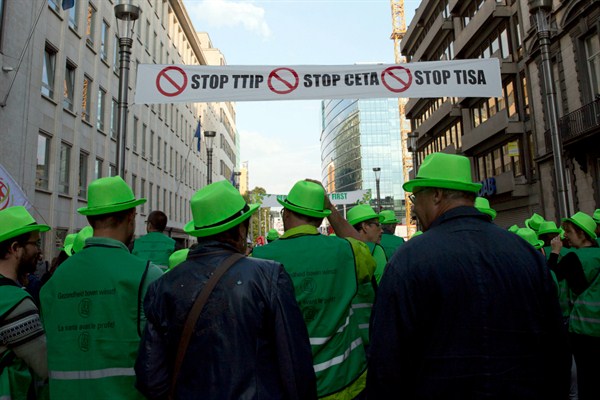From protectionist rhetoric in the U.S. presidential campaign and the Brexit referendum to worldwide protests against the Trans-Pacific Partnership (TPP) and Transatlantic Trade and Investment Partnership (TTIP), free trade is in a political rut. Concerns about income inequality, job loss and capital flight have deepened the sentiment that globalized trade benefits elites at the expense of everyday citizens. But that’s not necessarily the case. World Politics Review’s 10-article compilation helps to contextualize the debate.
The following articles are free for non-subscribers until Oct. 13.
The Case For and Against Free Trade
Liberalized Trade Is Under Attack. Can It Be Saved?
The negative consequences of free trade are often exaggerated, while its global benefits are misunderstood. In September, Kimberly Ann Elliot took an in-depth look at the debate over free trade. With inflammatory campaign rhetoric and protectionist movements threatening future economic prosperity, she explained, proponents of liberalized trade must do more than pay lip service to the deep losses that often accompany it.
With the U.S. presidential candidates all united in opposition to the TPP agreement, free trade has become a major political casualty of the 2016 U.S. presidential election. In July, Michael Cohen argued that the simplistic nature of each candidate’s criticisms fails to capture the big picture of trade as a net positive for the U.S. economy, and, most importantly, for American workers.
While expressing reservations about free trade during his own campaign in 2008, U.S. President Barack Obama has since embraced the traditional bipartisan consensus of support for the issue, aggressively pursuing the TPP and TTIP trade deals. But with free trade devolving into a toxic issue in this year’s presidential race, Erik Brattberg asked in September, Will Obama be America’s last free-trade president?
The shocking result of the Brexit referendum in June has become a symbol for the strong currents against globalization and free trade. As the dust settles, Arthur Snell wrote in July, Britain’s departure from the EU will be felt from Russia to Syria to China and beyond. How, exactly, might the U.K.’s grand isolationist gesture affect the future of global trade?
During Donald Trump and Hillary Clinton’s first presidential debate in September, there was one issue on which the candidates agreed upon the need for drastic change: trade. While economists accept the benefits of trade as fact, Frida Ghitis writes, those benefits are not so easily explained to the public, making it an easy target for politicians in the United States and Europe. What will be the implications for the future of trade policy?
Unpacking the Trans-Pacific Partnership
In World Politics Review’s Global Insider interview series about the TPP, expert analysts examine its potential impact on members’ economies, and political reaction to the deal in the individual signatory countries. Who stands to win and who stands to lose? And how is the debate playing out?
International trade is the single area of global governance where nations have agreed to cooperate most closely. Yet within the past half-century, each step toward greater integration has been met with increasing popular resistance. In that context, Edward Alden warned in December that the fate of international cooperation on trade could very well hinge on the success or failure of the TPP.
Despite opposition to the TPP, Obama has pledged to maintain his push for its approval in Congress. But with all the backlash against the deal, what would the TPP actually entail? In his August article, Edward Alden broke down the most important points of the TPP, explaining how it would affect currency manipulation, state-owned enterprises and the free flow of data.
Of Obama’s major policy goals during his time in office, passing the TPP and providing aid for Central America might seem unrelated at first glance. Yet by encouraging investment elsewhere in the Pacific region, Eric Farnsworth explained last August, the TPP may unintentionally undermine development goals in the region by dealing a major blow to its labor market.
The EU’s trade diplomacy in Asia is beginning to bear some fruit, including a landmark free trade agreement with Vietnam signed in December. But with other deals stalled, the EU’s economic outreach in Asia still falls short of its initial ambitions, David Kleimann argued in February. The increased competition from the Trans-Pacific Partnership would complicate that picture even more.

